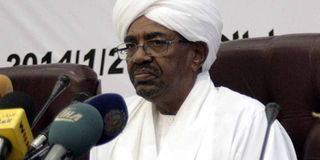Bashir calls for national dialogue

Sudan's President Omar al-Bashir delivers a speech on January 27, 2014 in which he appealed for a political and economic renaissance in his country ravaged by war, poverty and political turmoil, in Khartoum. PHOTO | AFP
What you need to know:
- He announced four major objectives set out in the reform plan: Realizing peace, protecting constitutional rights, reinvigorating the economy and reviving the national identity
- President Bashir further stressed on the importance of the free and fair election in the county
- Sudan ranks near the bottom of international indexes of corruption, human development and press freedom
KHARTOUM
Sudanese President Omar al-Bashir on Monday called on all political forces to hold a national dialogue to settle the political and economic issues facing his nation.
Addressing political leaders in Khartoum, al-Bashir declared a comprehensive reform plan prepared by the ruling National Congress Party (NCP).
“Sudan is looking up to a new phase following the transitional period and the separation of South Sudan, so there has to be preparedness for a great leap that essentially leads to national loyalty rather than partisan loyalty,” said al-Bashir.
He announced four major objectives set out in the reform plan: Realizing peace, protecting constitutional rights, reinvigorating the economy and reviving the national identity.
“Peace is the top priority, no development, political or economic development, can be achieved without peace,” President Bashir pledged.
“We will not exclude any party from this dialogue even the armed movements,” he confirmed. “Secondly the freedom of people has to be respected.”
President Bashir further stressed on the importance of the free and fair election in the county. “We in the National Congress Party are calling for all Sudanese to participate in this renaissance,” he said in the speech designed to address urgent calls for reform in his 25-year-old regime, but which fell short of critics’ expectations.
Most of opposition leaders attended Bashir’s speech, including Hassan Abdalla Al-Turabi, chief of the Popular Congress Party, Saddiq Al-Mahdi, chief of the National Umma Party, and Ghazi Salahuddin, founder of the Reform Group which defected from the NCP.
WRANGLINGS TO END
President Bashir made his appeal directly to opposition figures — including breakaway members of his own party.
The speech, billed as a major event by his party, follows a December cabinet shuffle which analysts said left the president more firmly in control.
Bashir said the country’s “unproductive political wrangling” should end but he made no direct mention of a cessation of hostilities on the battlefield.
Khalid Tigani, who helped found a movement seeking a more inclusive democratic system for Sudan, told AFP that after much talk it was time for Bashir to “prove that he is serious” about political dialogue to address Sudan’s multiple problems. “No development, political or economic, can come without peace,” said Bashir.
In addition to the long-running rebel-government clashes in Darfur, the government for more than two years has been fighting ethnic insurgents in the Kordofan districts and Blue Nile state.
The uprisings have been fuelled by complaints of economic and political neglect by the Arab-dominated regime.
Sudan ranks near the bottom of international indexes of corruption, human development and press freedom.
But Bashir said: “The freedom of people has to be respected.”
He added that freedom of political party activity “is not only limited to elections.”
Turabi and other opposition figures have been periodically detained and their media restricted.
CHANGE
During the September fuel-price unrest, security forces are believed to have killed more than 200 demonstrators, Amnesty International said, but the government has given a toll of less than half that figure.
Analysts said the spontaneous protests pointed to an urgent need for change by the regime.
The NCP moved to expel Atabani and two other dissidents who signed a memorandum which said the government’s response to the protests betrayed its Islamic foundations.
Farouk Abu Issa, who heads an alliance of all major opposition parties except Umma, told AFP ahead of Bashir’s speech that he wanted to hear the president apologise for the “suffering” his policies had caused, including the September killings and the wars throughout the country.
“He has to declare right away a ceasefire,” Issa said.



